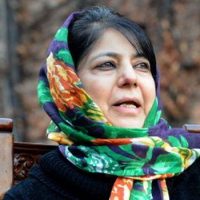Confusion Swirls around Kashmir Newspaper Ban in Wake of Violent Street Protests
 Mehbooba Mufti (photo: Getty Images)
Mehbooba Mufti (photo: Getty Images)
By Aijaz Hussain, Associated Press
SRINAGAR, India (AP) — Authorities lifted a three-day publication ban in the Indian-controlled portion of Kashmir, but newspapers delayed print runs Tuesday due to uncertainties about the media restrictions imposed during massive anti-India protests that left dozens of people dead and hundreds injured.
Newspapers owners and editors said the Kashmir government had yet to guarantee smooth media operations in the prevailing tense situation.
The government made a verbal apology and called the ban a "mistake," but then authorities "resorted to a propaganda blitzkrieg insisting that there was no ban," said Masood Hussain, a senior journalist and editor of the English weekly Kashmir Life, after the meeting with others in the local media industry. "It indicates that the government has not changed its press emergency."
He said the editors would review the situation Wednesday. "Government must own the ban and issue a statement guaranteeing that media operations are not being hampered from the movement of staff, to news gathering, printing and the distribution of the newspapers," Hussain said.
The state government's political adviser, Amitabh Mattoo, said the decision to temporarily ban newspaper publication was made without the knowledge of the state's top elected official, Mehbooba Mufti.
"Sometimes decisions taken at a local level is not something the highest authority approves of. There was some miscommunication," he said.
"We need to know who took the decision on the ban. We will take action once the crisis is over," he told New Delhi-based NDTV news channel late Monday.
Kashmir's largest street protests in years erupted more than a week ago after Indian troops killed the popular, young leader of the largest rebel group fighting against Indian rule in the disputed region. Violent clashes between rock-throwing Kashmiris and troops firing live ammunition, pellet guns and tear gas have persisted despite a strict curfew in place for an eleventh day Tuesday. Streets were mostly deserted otherwise, and with shops still closed, people were trying to cope with shortages of food and other necessities.
State government spokesman and Education Minister Nayeem Akhtar had said Friday the ban was aimed at "saving lives and strengthening peace efforts." Police raided newspaper offices, detained printing press workers and seized tens of thousands of local newspapers. The detained workers have since been freed.
In addition to the printing ban, cellular and internet services were absent and landline phone access limited throughout Kashmir, except in its main city of Srinagar, creating an information void.
Hussain, the journalist, told AP earlier that the communication and information blockade was powering rumors. "People want to know what's happening around and when we fail to provide news, rumor mill takes over. It doesn't help anyone," he said.
The latest fatality was reported Tuesday after a woman injured in Indian army firing overnight died in a hospital in Srinagar, a police officer said.
Two people, including a woman, were killed late Monday after soldiers fired at rock-throwing protesters in southern Qazigund area, said the officer speaking on a customary condition of anonymity.
The clashes have killed at least 46 people, mostly teens and young men, and a policeman since July 9. Nearly 2,000 civilians and about 1,600 government troops have been injured.
Separatist leaders have extended their strike call until Thursday afternoon followed by a shutdown and protests on Friday. The key leaders, Syed Ali Geelani, Mirwaiz Umar Farooq and Yasin Malik, in a statement late Monday said Indian leaders were "blinded by their own propaganda ... to the extent that (they're) unable to understand and accept the genuineness of people's anger and self-drive for freedom and justice."
Kashmir, a predominantly Muslim region, is divided between India and Pakistan, but both claim it in its entirety. Most people in Indian-held part resent the presence of hundreds of thousands of Indian troops and want independence or a merger with Pakistan.
Since 1989, more than 68,000 people have been killed in the uprising against Indian rule and the subsequent Indian military crackdown. India and Pakistan have fought two wars over control of Kashmir since British colonialists left the Indian subcontinent in 1947.
To Learn More:
Kejriwal Targets Media, Threatens “Public Trials” (by Karan Singh, AllGov India)
- Top Stories
- Controversies
- Where is the Money Going?
- India and the World
- Appointments and Resignations
- Unusual News
- Latest News
- India College Chain’s Expansion into U.S. Draws Opposition from Massachusetts Officials over Quality of Education
- Milk Shortages in India Tied to Release of New Movies Featuring Nation’s Favorite Stars
- Polio-Free for 5 Years, India Launches Vaccine Drive after Polio Strain Discovery
- New Aviation Policy Could Increase Service, Lower Ticket Prices
- Scientists to Study Link Between Ocean Conditions, Monsoon With Robots






Comments